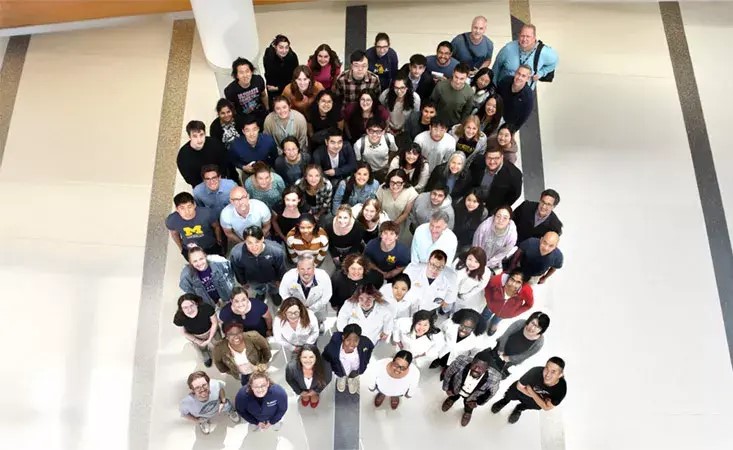Targeting rewired metabolic pathways in pancreatic cancer
Published in Cancer
Pancreatic cancer is one of the deadliest cancers. Only 13% of people diagnosed survive for 5 years or more, and it is predicted to become the second leading cause of cancer death by 2030. This primarily stems from late diagnosis and the lack of effective therapies. We do not have effective screening methods, and disease presents with vague symptoms often attributed to other conditions, particularly in the elderly population. Together, this means that pancreatic cancer is often diagnosed after it has spread (metastasized). At this stage, currently available medicines (i.e. chemotherapy) do not control the disease.
So what is being done about this critical medical challenge?
At the University of Michigan Rogel and Blondy Center for Pancreatic Cancer, our group, consisting of nearly 100 scientists and physicians, brings together a wide range of expertise to collaborate and attack pancreatic cancer from all angles and at all stages.
In our present study, a collaborative project between Dr. Arul Chinnaiyan’s laboratory in the Michigan Center for Translational Pathology and Dr. Costas Lyssiotis’ laboratory in the Rogel and Blondy Center for Pancreatic Cancer, we sought to identify new pancreatic cancer drug targets. We focused on metabolism because, from previous studies, we knew that pancreatic cancer cells rely on altered metabolic pathways. Namely, pancreatic cancer cells obtain nutrients by using recycling and scavenging mechanisms that depend on the lysosome - an organelle thought of as the “garbage disposal system” of the cell. While such an approach has previously been considered in pancreatic cancer, the drugs that are currently available are not effective, and it is still unclear exactly how those drugs work. This makes it difficult to improve the drugs to increase their effectiveness.
This is where our study comes in: we discovered that PIKfyve, a gene that controls lysosome function, might be the key to targeting this pathway. Using mouse models of pancreatic cancer, we found that blocking PIKfyve (as a single agent) impairs the ability of pancreatic cancer to form and grow, notably without affecting the function of the normal pancreas or causing side effects in mice. While promising, tumors do ultimately grow and kill the mice under PIKfyve inhibition.
Thus, to determine how pancreatic cancer cells adapt to PIKfyve inhibition, we applied CRISPR screening alongside gene expression profiling. From this, we identified that pancreatic cancer cells adapt to PIKfyve loss by increasing the production of lipids. These results indicated that, by blocking both PIKfyve and the ability to generate lipids, we could trap pancreatic cancer in a corner.
It turns out that the ability of pancreatic cancer cells to make lipids is controlled, at least in part, by KRAS -- the main “driver” of pancreatic cancer. While this work sheds new light on the role of KRAS in lipid synthesis, we have long known of its importance in other aspects of pancreatic cancer. However, it was not until very recently that we have had a way to target it. Taking advantage of these new KRAS inhibitors, or inhibitors of the KRAS signaling pathway (i.e. MAPK), our study ultimately demonstrated that combination KRAS and PIKfyve inhibition consistently stunted pancreatic tumor growth, curing tumors in mice.
The 5-year survival rate for pancreatic cancer has nearly doubled in the last 10 years. With the recent advent of KRAS inhibitors, we are more hopeful than ever that we can further improve this statistic. Our study shows that targeting rewired metabolic pathways in pancreatic cancer may be a promising approach, particularly in conjunction with KRAS inhibitors. Indeed, our lead PIKfyve inhibitor has cleared Phase I safety trials and is in a Phase II trial to test efficacy in pancreatic cancer (NCT05988918). We at the Chinnaiyan and Lyssiotis labs, and the entire Rogel and Blondy Center for Pancreatic Cancer at the University of Michigan, are excited about extending our preclinical work to new combination clinical trials. We are working hard every day to develop new diagnosis and treatment strategies to improve the landscape of pancreatic cancer care.


Follow the Topic
-
Nature

A weekly international journal publishing the finest peer-reviewed research in all fields of science and technology on the basis of its originality, importance, interdisciplinary interest, timeliness, accessibility, elegance and surprising conclusions.





Please sign in or register for FREE
If you are a registered user on Research Communities by Springer Nature, please sign in